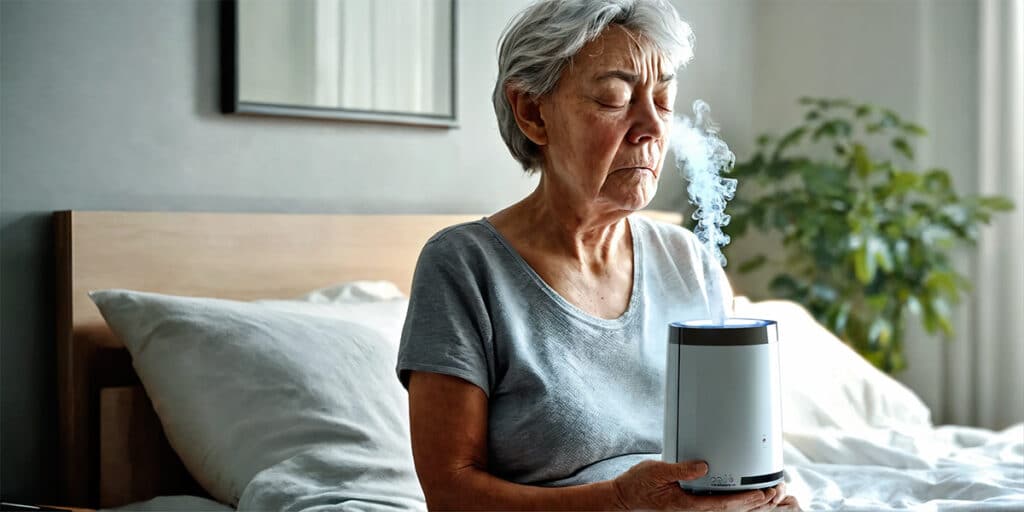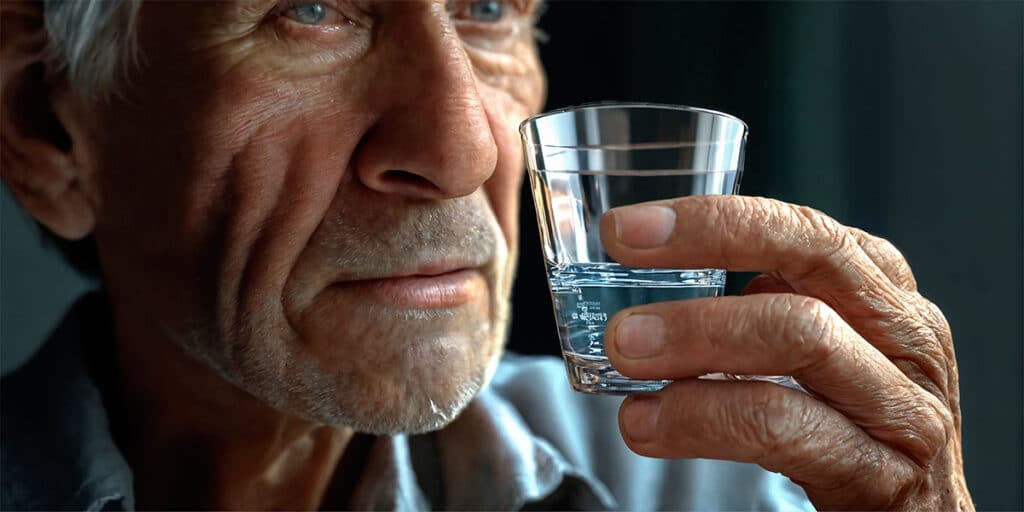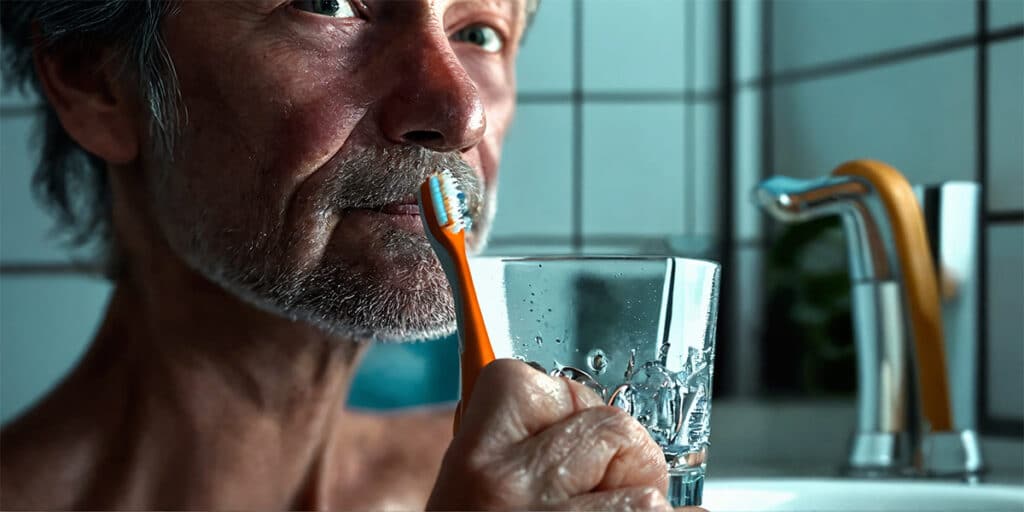Dry mouth, known medically as xerostomia, affects a significant number of seniors, impacting their quality of life by contributing to difficulties in speaking, eating, and an increased risk of dental health issues.
This guide delves into real stories of seniors who found relief from dry mouth through various products, offering hope and actionable solutions.
The Battle Against Dry Mouth
Dry mouth, or xerostomia, presents a significant challenge for seniors, impacting not just their oral health but their overall well-being and quality of life. This condition, characterized by a reduced flow of saliva, can be particularly prevalent among the elderly due to a confluence of factors including medication side effects, systemic health conditions, and the natural changes that come with aging.
Medication-Induced Dry Mouth
One of the most common culprits behind dry mouth in seniors is medication. With age, it’s not uncommon for individuals to require various medications for managing chronic conditions such as hypertension, depression, or diabetes. Unfortunately, a side effect of many of these medications is reduced saliva production. From antihypertensives to antihistamines, the array of medications that can impact salivary flow is vast, affecting the mouth’s natural ability to stay moist.
Health Conditions and Dry Mouth
Beyond medication, certain systemic health conditions themselves can lead to dry mouth. Autoimmune diseases like Sjögren’s syndrome directly impact the body’s moisture-producing glands, including those responsible for saliva. Similarly, diabetes, when not adequately controlled, can lead to dehydration and subsequently, dry mouth. These conditions highlight the interconnectedness of systemic health and oral wellness, emphasizing the importance of comprehensive care.
Aging and Reduced Saliva Production
Aging naturally brings about changes in the body’s ability to produce saliva. Salivary glands may become less efficient, and the cumulative effects of a lifetime of environmental exposures, including smoking and alcohol use, can further exacerbate this decline. Moreover, the aging process can affect the perception of dryness, sometimes making it harder for seniors to recognize the onset of dry mouth until it has significantly impacted their oral health.
The Critical Role of Saliva
Saliva is often taken for granted, yet it plays a pivotal role in maintaining oral health. Beyond its function in aiding digestion by breaking down food and facilitating swallowing, saliva acts as a natural mouth cleanser. It washes away food particles and neutralizes acids produced by bacteria in the mouth, helping to prevent decay and gum disease. Saliva also contains enzymes and proteins essential for combating oral pathogens, underscoring its role in preventing infections.
Real Stories of Relief
The battle against dry mouth, particularly among seniors, is a nuanced struggle involving various strategies and products. Each individual’s journey to find relief is unique, shaped by their lifestyle, preferences, and the specific causes of their condition. The stories of John, Mary, and George offer insight into how diverse solutions can effectively manage dry mouth symptoms, providing real-world examples of overcoming this challenge.
John’s Journey: Hydration and Humidifiers
For John, a 72-year-old retiree, the key to mitigating his dry mouth was a combination of simple yet effective measures: increasing his daily water intake and using a humidifier in his bedroom. Previously disrupted by the discomfort of dry mouth at night, John noticed a significant improvement in his symptoms, attributing this change to the consistent use of a humidifier which added much-needed moisture to his sleeping environment.
Benefits of Humidifiers: By elevating the moisture levels in his room, John found that his mouth felt less dry, which not only improved his sleep quality but also his overall oral health. Humidifiers, by supplementing the air’s moisture, can offer considerable relief for dry mouth sufferers, making them a non-invasive solution to enhance saliva production indirectly.
Mary’s Method: Saliva Stimulants
Mary, 68 years old and an avid gardener, explored various products before discovering that over-the-counter saliva stimulants provided the daytime relief she sought. These stimulants became an integral part of her routine, allowing her to enjoy her gardening and daily activities without the constant distraction of dry mouth.
Benefits of Saliva Stimulants: Saliva stimulants work by encouraging the body to produce more natural saliva, effectively counteracting the sensation of dryness. For Mary, these products meant not just improved comfort but also better protection against tooth decay and gum disease, conditions exacerbated by a lack of saliva.
George’s Solution: Specialty Oral Care Products
George, a 75-year-old former teacher, tackled his dry mouth with a targeted approach, incorporating specialty oral care products into his daily hygiene routine. By choosing toothpaste and mouthwash specifically formulated for dry mouth, he noticed an improvement not only in his symptoms but also in his overall dental health.
Benefits of Specialty Oral Care Products: These products are designed to do more than just clean; they help add moisture and protect the mouth’s delicate tissues. For George, using these specialty items meant a reduction in discomfort and a decrease in the risk of developing more severe oral health issues linked to dry mouth.
The experiences of John, Mary, and George highlight the effectiveness of various strategies in managing dry mouth. From humidifiers that add moisture to the air, saliva stimulants that enhance the body’s natural saliva production, to specialty oral care products that provide targeted relief and protection, the path to alleviating dry mouth symptoms involves a personalized approach. Their stories of relief underscore the importance of experimenting with different solutions to find what works best for each individual, offering hope and practical options for those navigating the challenges of dry mouth in their senior years.
| Product Type | Product Name | Key Benefits |
|---|---|---|
| Saliva Substitute | MoistureLips | Provides instant moisture and relief |
| Mouthwash | HydraMouth | Alcohol-free, enhances mouth moisture |
| Toothpaste | GentleCleanse | Formulated for dry mouth, with fluoride |
| Chewing Gum | SalivaGum | Sugar-free, stimulates saliva production |
| Humidifier | AirMoist 3000 | Increases air moisture for nighttime relief |
Overcoming Dry Mouth: A Multifaceted Strategy
Dry mouth, or xerostomia, is more than just an inconvenience; it can significantly impact one’s quality of life and oral health. The journey to finding relief is often personal and requires a blend of strategies tailored to individual needs. By weaving together hydration, comprehensive care, and diligent maintenance, seniors can effectively combat the symptoms of dry mouth.
The Hydration Boost Method
Staying well-hydrated is foundational in the battle against dry mouth. Beyond the basic advice of drinking ample water, hydration involves understanding and integrating behaviors that promote moisture throughout the body.
Scientific Perspective: Studies suggest that increasing fluid intake can significantly improve dry mouth symptoms. For instance, a study published in the Journal of the American Dental Association underscores the correlation between hydration and improved salivary flow rates.
Personal Anecdote: Linda, a 69-year-old avid walker, found that carrying a water bottle and setting reminders to drink water throughout her walks made a noticeable difference in her dry mouth symptoms, illustrating how small lifestyle tweaks can yield significant benefits.
The Comprehensive Care Approach
No single product or method can address all the facets of dry mouth. Successful management often involves a combination of saliva substitutes, specialized oral care products, and lifestyle adjustments.
Expert Opinion: Dr. Emily Peterson, a geriatric dentist, advocates for a holistic approach to managing dry mouth. She notes, “Integrating saliva-stimulating products with meticulous oral hygiene and avoiding dehydrating substances like caffeine can dramatically improve outcomes for those suffering from dry mouth.”
Combining Strategies: Using a humidifier at night to increase air moisture, along with saliva-stimulating lozenges during the day, exemplifies how layering different methods can provide round-the-clock relief.
The Importance of Maintenance
The effectiveness of any product, from humidifiers to oral hygiene tools, hinges on regular maintenance. Ensuring these products are clean and functioning optimally is key to their success in managing dry mouth.
Maintenance Tips: Regular cleaning of humidifiers to prevent mold growth, replacing toothbrushes every three months to ensure effective cleaning, and routine dental check-ups to monitor oral health are all essential practices.
The Impact of Neglect: A neglected humidifier can become a source of bacteria and mold, which can exacerbate respiratory issues and undermine the benefits of increased air moisture.
Integrating Strategies for Effective Management
Combining hydration strategies with personalized product selection and rigorous maintenance creates a powerful toolkit for seniors battling dry mouth. By adopting a holistic and personalized approach, it’s possible to not only alleviate the symptoms of dry mouth but also to enhance overall oral health and well-being.
The collective wisdom from research, personal experiences, and professional advice underscores a critical message: overcoming dry mouth is achievable. It requires a commitment to understanding one’s own needs, experimenting with different solutions, and maintaining a consistent care routine. With these strategies in hand, seniors can navigate the challenges of dry mouth with confidence, finding relief and improving their quality of life.
How Seniors Overcame Dry Mouth with These Products: Your FAQs Answered
What are the most effective products for combating senior dry mouth?
Seniors have found relief using a range of products, including over-the-counter saliva substitutes, specialized mouthwashes and toothpastes designed for dry mouth, and humidifiers to maintain moisture in their living spaces.
How do saliva substitutes work?
Saliva substitutes mimic the natural lubrication and protective qualities of saliva, helping to moisten the mouth and alleviate discomfort associated with dry mouth.
Can changing my diet help with dry mouth?
Absolutely. Incorporating hydrating foods and drinks, and avoiding caffeine and alcohol can significantly improve dry mouth symptoms.
Are humidifiers safe for seniors to use?
Yes, when used properly. Humidifiers add moisture to the air, which can help relieve dry mouth symptoms, especially in dry climates or during winter months. It’s important to keep them clean to prevent mold growth.
What oral hygiene practices are recommended for seniors with dry mouth?
Gentle brushing with a soft-bristled brush, using fluoride toothpaste, flossing daily, and regular dental check-ups are key. Avoid alcohol-based mouthwashes as they can exacerbate dry mouth.
How often should I use mouthwash specifically formulated for dry mouth?
Follow the product’s instructions, but most are safe for daily use and can be used multiple times a day, especially after meals and before bed.
Can certain medications cause dry mouth?
Yes, many medications have dry mouth as a side effect. Consult with your healthcare provider about possible alternatives or treatments to counteract this.
Is it important to stay hydrated if I have dry mouth?
Absolutely. Drinking plenty of water throughout the day is crucial for maintaining moisture in the mouth and overall health.
Do over-the-counter dry mouth products have side effects?
Most are very safe, but some people may experience mild discomfort or allergic reactions. Always check the ingredients list and consult with a healthcare provider if you’re unsure.
When should I see a dentist about my dry mouth?
If dry mouth persists despite using over-the-counter remedies, or if you notice changes in your oral health, it’s important to see a dentist for a professional assessment and personalized treatment plan.
Citations
- Furness, S., Worthington, H. V., Bryan, G., Birchenough, S., & McMillan, R. (2013). “Interventions for the management of dry mouth: Non-pharmacological interventions.” Cochrane Database of Systematic Reviews, Issue 9. Art. No.: CD009603. This systematic review evaluates the effectiveness of non-pharmacological interventions for managing dry mouth.
- Villa, A., Connell, C. L., & Abati, S. (2015). “Diagnosis and Management of Xerostomia and Hyposalivation.” Therapeutics and Clinical Risk Management, 11, 45-51. This study discusses the causes of dry mouth and hyposalivation and provides a comprehensive approach to their diagnosis and management.
- Sreebny, L. M., & Schwartz, S. S. (2010). “A reference guide to drugs and dry mouth – 2nd Edition.” Gerodontology, 27(3), 173-179. This reference guide offers detailed information on medications that cause dry mouth as a side effect, serving as a valuable resource for healthcare providers and patients.
- Napeñas, J. J., Brennan, M. T., & Fox, P. C. (2009). “Diagnosis and treatment of xerostomia (dry mouth).” Odontology, 97(2), 76-83. The article provides an overview of the diagnosis and treatment options for xerostomia, emphasizing the need for a tailored approach based on the underlying cause.
- Turner, M. D., & Ship, J. A. (2007). “Dry mouth and its effects on the oral health of elderly people.” Journal of the American Dental Association, 138(Suppl 1), 15S-20S. This paper reviews the impact of dry mouth on oral health in elderly populations and discusses strategies for management and prevention.








